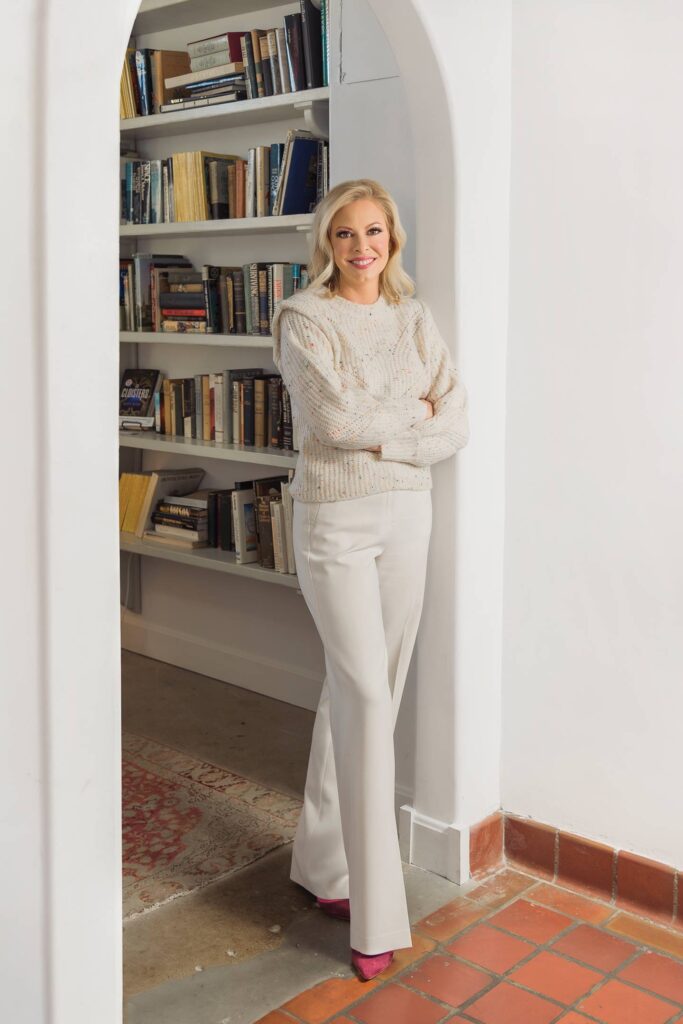

As a CEO, wife, mom, and friend, Lesley Scearce has a seemingly endless list of responsibilities. Through a little trial and error, however, Scearce has learned that living a happy, healthy, and fulfilling life doesn’t have to be overly complicated. By honoring the season she is in and living every day in accordance with her values, Scearce is finding a new lease on life – one that leaves her feeling satisfied and whole rather than stuck on empty.
HS: How would you describe your approach to wellness, and how has that changed throughout the decades?
LS: I used to think that wellness was all about looking at the different dimensions of your life and balancing them out. I would try to give each segment equal attention, but I’ve learned over the years that is impossible. Balance is a myth. The more we try to balance things equally the more something is always going to lose. Now my approach to wellness has become about wholeness. I have to continually look at my priorities and recognize the season that I am in. It’s okay to take whatever is the most critical at any given point and give it the time and attention it’s due. Life is messy, and it doesn’t fit nicely into equal spheres. In my experience, trying to force your life into that prescription often leads to feeling worn down and empty.
HS: What have been some of your recent challenges, and how did you overcome those?
LS: I’m going to be really honest. I’ve been a CEO since I was in my early 20s, and with that came a lot of responsibility. I haven’t always prioritized that properly. It’s hard. Even last year, I noticed stress was starting to take a toll, and your body really does keep the score. I got to a point in December where I had to take a step back. I was really candid with my team, and I told them I needed a break. I took three extra weeks off around Christmas, which for me was huge, to walk, sleep, pray, journal, and do yoga. I spent uninterrupted time with my family and tried to really put my health first. I even deleted the email app from my phone! That one little thing let my kids know they came first, let my staff know that I trusted them to do their jobs, and gave me the space to reset so I could show up as a better leader when I came back. I learned that only I can take care of myself, my family, and model this priority for others at United Way.
HS: What are some of your favorite ways to practice self-care?
LS: It may seem counterintuitive, but I combat burnout by adding things I love to life rather than subtracting what I don’t. So for me, self-care is concerts with my husband, time with friends, and hikes in nature.
HS: What are some of the traits that you value the most in yourself?
LS: This is a hard question for me, but one thing I do appreciate about myself is that I’m a lifelong learner. From learning to ski at 38 to learning how to lead others, I’m good at learning. I became an executive director at just 22, and I think leading at that level when I was that age instilled a notion to always stay curious and learn how to be the best leader I could be. I think God gifted me with the ability to be visionary but also very practical.
HS: What are some of your current goals?
LS: As we kick off 2023, one thing that has been on my mind a lot, both professionally and personally, has just been steadiness. In the last seven years at United Way, we’ve charted tremendous change and growth, and we’ve served through some big crises. Now we need to move forward in a way that’s consistent and purposeful, and I want that in my personal life too. As a wife and a mom and a leader, my goal is simply to be consistent, steady, and strong for those around me and for myself. Amazing things can happen when you have an alignment in your personal and professional life in that way.
HS: Is there anyone that you look up to or admire when it comes to how they live their life?
LS: When it comes to health and wellness, my friend Patricia McClelland has taught me through example that it’s not about what you can do, it’s about what is sustainable. Most of us can do an awful lot and we’re capable of whatever we put our minds to, but sometimes we can get going on a trajectory that’s just really difficult to sustain.
HS: How do you approach your emotional and mental health?
LS: This past year, I had someone who challenged me to write my epitaph, and it was an enlightening experience. What I learned through this exercise was to step back and look at what really matters to me and what I want to be known for. It helped me realize that if I can be very clear about living out my values every day, then it is much easier to be healthy and whole.

